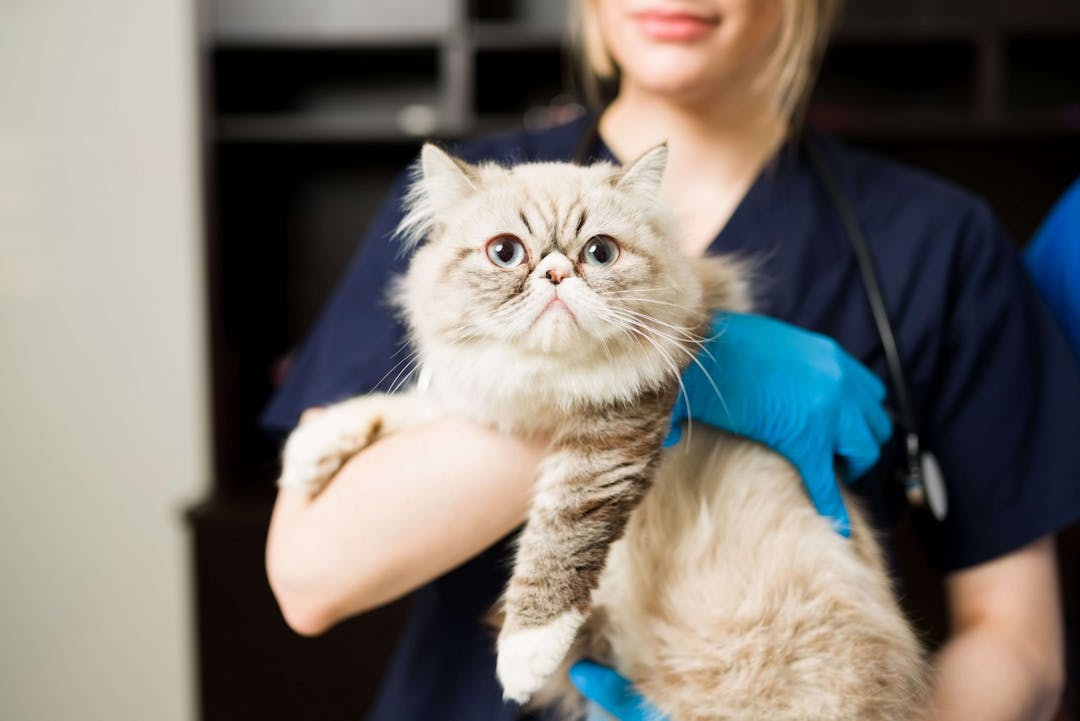Like many cat parents, you’re probably wondering about which vaccines are right for your kitty, whether or not there are any side effects, and how much it’s all going to cost. If you’re a pet parent looking for answers about vaccines for your kitten, adult cat, or senior cat, you’ve come to the right place.
Common Vaccines for Cats
Members of the Feline Vaccination Advisory Panel research and evaluate vaccine developments and make recommendations based on their findings. They’ve divided vaccines for cats into two categories: some are required (core) and others that are sometimes recommended depending on a cat’s lifestyle (noncore).
Core Vaccines
- Rabies
Not only is this disease dangerous and fatal for unvaccinated cats, but it’s also transmissible and can be fatal to humans. Rabies is prevalent all over the world, so the vaccine is recommended for all pet cats.
- FVRCP
The remaining three core vaccines are combined into a single three-in-one shot called the FVRCP (feline viral rhinotracheitis, calicivirus, and panleukopenia) vaccine.
- FPV
Feline panleukopenia, which is also known as feline parvovirus, is highly infectious and has a high mortality rate in kittens. FPV destroys white blood cells, making infected kittens more vulnerable to secondary infections.
- FHV-1
Feline herpesvirus, (or feline rhinotracheitis virus) is a highly contagious virus that causes severe upper respiratory infections. Cats infected with FHV-1 could experience congestion, nasal discharge, sneezing, and conjunctivitis. After a cat has recovered from FHV-1, the virus can remain dormant and can reactivate during stressful times.
- FCV
Feline calicivirus includes multiple viral strains that cause symptoms of upper respiratory infection similar to FHV-1. Strains can cause inflammation of the teeth and gums, hair loss, and even death.
- FeLV – (also see below) This vaccine is recommended for all kittens so that their immune system has some protection against the virus. Once their lifestyle as an adult is more secure, then the pet parent can decide with the veterinarian if the cat needs to continue boostering it or not. Feline leukemia virus infection can cause blood disorders, immune deficiency and cancer and can be fatal over time.
These core vaccines are recommended for all cats because these diseases are extremely infectious, widespread, and can be life-threatening. The vaccines are highly effective and have minimal risk.
Noncore Vaccines for Cats
- FeLV This vaccine protects against feline leukemia virus. FeLV exists worldwide and is transmitted through body fluids like saliva, urine, and feces. Though it is not generally considered core, it is recommended as core for kittens only and recommended for cats that go outdoors or are exposed to large numbers of other cats.
- Chlamydophila felis Chlamydophila felis is a bacteria that predominantly infects the eyes but is also associated with upper respiratory tract disease.
- Bordetella bronchiseptica Bordetellosis is a contagious bacterial disease that causes irregularities in the upper respiratory tract. Bordetellosis is most severe in kittens younger than 6 weeks old and those living in unhygienic conditions.
If you have a kitten, you should definitely include FeLV in your vaccination schedule. Other than that, talk to a vet to find out if the other vaccines are appropriate for your fur baby.
Recommended Schedule / Timing for Vaccines
Since kittens under 6 months old are especially susceptible to contagious diseases, it’s important to get started on your new kitty’s vaccinations right away.
Schedule the core kitten vaccinations starting at 8-9 weeks of age and then booster at three- to four-week intervals until your cat is 16-20 weeks old.
For cats older than 16 weeks (or if their vaccine history is unknown), two doses are given three to four weeks apart.
Core vaccines require booster shots after one year.
Scientists are still learning about how long these vaccines last. Right now, the recommendation for indoor/outdoor cats is to get the FVRCP vaccine and Rabies once as a kitten and then booster at a year of age and then every three years or as indicated by local laws.
If you have specific questions about vaccines for your kitten, adult cat, or senior cat, a veterinarian can determine a vaccination schedule based on your cat’s age, medical history, vaccination history, and the likelihood of exposure.
Costs to Expect
The average cost of vaccines is $15-$28 per shot. Between the initial core vaccinations and the boosters, costs can add up, but preventative treatments are an important part of keeping your pet and the community healthy, so don’t skip or delay treatments because of the cost. Consider a wellness plan to help you budget and pay for your cat’s preventative and routine care—including vaccinations.
Are you also a dog parent wondering which vaccines are best for your pup? Read our blog to find out which vaccines are recommended for dogs.







